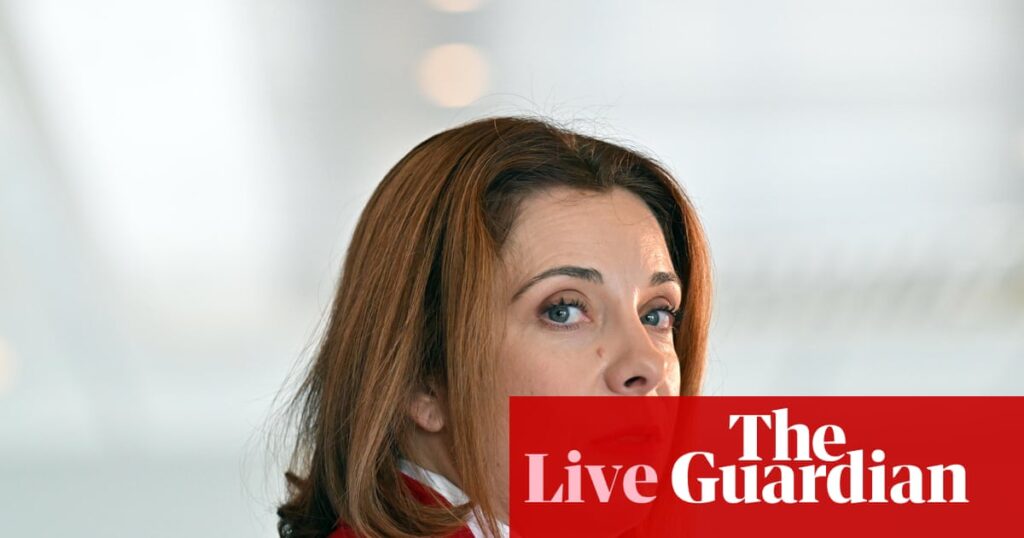Government to work on restricting ‘nudify’ deepfake apps
The government will work to restrict access to so-called “nudify” apps and undetectable online stalking tools, that use generative AI to create deepfake pornographic images.
The restrictions will be put in place in consultation with industry, and communications minister Anika Wells says that like the social media ban for under 16s, the onus will be on the tech companies to prevent the availability of these tools.
In a statement, Wells said these “abusive technologies” are widely and easily accessible.
These new, evolving, technologies require and a new, proactive, approach to harm prevention– and we’ll work closely with industry to achieve this.
While this move won’t eliminate the problem of abusive technology in one fell swoop, alongside existing laws and our world-leading online safety reforms, it will make a real difference in protecting Australians.
Key events
The aged care legislation delay is “relatively short” says Mark Butler, facing questions on RN Breakfast over why the government won’t bring more home care packages online now.
Speaking to RN Breakfast, Butler is asked how many senior Australians will die waiting for assessments and packages between now and November.
Butler says he can’t predict that figure, but is working to get the waitlist figure down.
[This is] a relatively short delay. Really, four months we’ve pushed the new system down the road from the 1st of July to the 1st of November, as you say. The sector wanted it. They didn’t think they were ready to do this.
We’ve now got to get this last part of the legislation through the parliament this week, because if we don’t, we will not be able to introduce the new system on the 1st of November.
The Coalition and crossbench will work together to force the government to bring forward funding for more home care packages, with an amendment to the bill currently being debated in the Senate.
Dan Tehan is a man under pressure. While members of the party including Barnaby Joyce push for a more immediate position on net zero and nuclear, the shadow energy minister has been charged with reviewing the Coalition’s energy policy, which he says will take nine to 12 months.
Speaking to ABC RN Breakfast, Tehan says he won’t be rushed in setting the Coalition’s energy policy.
Asked whether the Coalition can come to an agreed position when Nationals like Joyce and senior Liberals like Andrew Hastie are pushing for net zero to be scrapped. Tehan doesn’t give us an iron clad promise that they’ll come together:
That’s what we’ve got to work through over the next nine to 12 months. And we’ve got to make sure that we land this in the best interests of the Australian people. And that’s what I’m seeking to do. And that’s why we’ll work methodically through it. Take our time to make sure that we get it right.
Sally Sara puts former Liberal frontbencher, and now OECD Secretary-General Mathias Cormann’s plea to the Coalition to focus on how to meet net zero.
Tehan says “everyone’s comments are always helpful” in this debate, but that Cormann is concerned about where the Australian economy is going (completely steering clear of Cormann’s call to the Coalition).
Rallies ‘deeply unsettling for many Australians’: Mark Butler
Mark Butler is continuing his media rounds and has moved across to ABC News Breakfast.
The protests over the weekend dominated parliament and morning media yesterday, and the reaction to some of the scenes seen on Sunday continues today.
Butler says state police are investigating whether there were hate speech laws that were breached, and that appropriate laws “need to be enforced”. But the main thing the parliament needs to do is reinforce the message of social cohesion, Butler says.
I think these rallies were deeply unsettling for many Australians. For most Australians who saw from that rally, a message of division, intolerance and in some cases, violence – including violence against police.
I think what we want to do from a federal government [point of view] is just reinforce the importance of social cohesion – the importance of us being a really successful multicultural community with all of the benefits.
Government to work on restricting ‘nudify’ deepfake apps
The government will work to restrict access to so-called “nudify” apps and undetectable online stalking tools, that use generative AI to create deepfake pornographic images.
The restrictions will be put in place in consultation with industry, and communications minister Anika Wells says that like the social media ban for under 16s, the onus will be on the tech companies to prevent the availability of these tools.
In a statement, Wells said these “abusive technologies” are widely and easily accessible.
These new, evolving, technologies require and a new, proactive, approach to harm prevention– and we’ll work closely with industry to achieve this.
While this move won’t eliminate the problem of abusive technology in one fell swoop, alongside existing laws and our world-leading online safety reforms, it will make a real difference in protecting Australians.
Migration figures: Butler says he doesn’t know ‘number off the top of my head’
Mark Butler is doing the media rounds this morning. He’s popped up on the Today show and is being asked about Australia’s migration figure for this year.
The weekend’s protests, centred on anti-immigration sentiment, have led to some false claims about Australia’s migration numbers. My colleague Josh Butler has done a deep dive on what the actual numbers are, which you can read here.
Butler says the overseas migration figure, published by the Treasury department, has been coming down from a post Covid surge.
Asked what the permanent migration numbers are for the 2024-25 year, which the government had set to 185,000, Butler doesn’t have “that number right off the top of my head” but says the number is higher than that – though it is around 40% lower than the number of migrants coming in during that post-Covid peak.
I think there is a real tension between recognising that there are real pressures on our housing system and other parts of the economy, while also, I know, intimately recognising we’re really struggling to get the workers we need to deliver the hospital services, the aged care services and build the houses.
Karl Stefanovic isn’t happy that the government isn’t handing over the current migration numbers and says this interview “is a bit like an episode of Frontline”.
Labor and Liberal frontbenchers agree: public land should be public land
There’s at least one thing that Labor frontbencher Amanda Rishworth and Liberal frontbencher Tim Wilson have in common, and that’s an opposition to a Sydney council’s idea to charge large groups – including schools, dog walkers or personal trainers – to pay to use public parks.
North Sydney council is considering a new fee for groups of 21 people or more at parks that are heavily used by private schools and commercial operators.
On the Today show earlier, Rishworth said “public land should be public land”:
Public land should be public land … from time to time councils might need to manage how that public land is shared. But ultimately public land should be public land.
Wilson said the idea “doesn’t pass the pub test”, but there were exceptions.
Unless you’re using it for a commercial purpose, and then, of course, if you’re part of a small business using it for commercial purpose, then there should be some discussion.

Josh Butler
Australia must modernise its health system and chase productivity gains in the care field, the Business Council has said in a major new report, saying hospitals must upgrade from systems sometimes based on paper copies and fax machines.
The BCA says the healthcare sector must also look to maximise benefits from artificial intelligence, which the business group says could free up big chunks of doctors’ time so they can see more patients or avoid burnout.
Its Supporting A Healthy and Productive Nation report says without greater innovation, the health system will face poorer service delivery in future. It notes the number of retirees to working-age people rising, the gap between Medicare levy revenue and benefits paid out and increasing expediture on aged care and the NDIS.
A major recommendation is for the health system to invest more in digital technology in a bid to increase productivity and eliminate duplications or errors.
Rohan Mead, chair of the BCA’s Health committee and CEO of banking and insurance firm Australian Unity, said:
In 2025, it would astound many Australians that the majority of hospitals are still paper-based and that up to 75% of global fax traffic comes from medical services.
AI has the potential to free up 30% of a clinician’s time, allowing them to spend more time with Australians, while telehealth already saves Australians up to $895m per year in reduced travel – these are improvements that make everyone better off.

Krishani Dhanji
Good morning,
Krishani Dhanji here with you for what will be another busy sitting day in parliament, thanks to Martin Farrer for getting us started.
There’s plenty coming up, so let’s get straight into it!
Arguments to reduce tobacco excise ‘simplistic’ and ‘misguided’: AMA

Natasha May
Calls to reduce the tobacco excise as a way to tackle the illegal tobacco industry are a “simplistic, misguided and ineffective solution”, Australia’s peak medical body says.
The president of the Australian Medical Association, Dr Danielle McMullen, said there had been a “worrying increase in calls to reduce tobacco excise, with the idea, not surprisingly, backed by big tobacco.”
The scheduled rise in the tobacco excise occurred earlier this week after criticism from the NSW premier, Chris Minns, and Victoria’s minister for casino, gaming and liquor regulation, who blamed high tobacco prices for a spike in violent crime related to the illicit trade – an idea which was rejected by federal ministers, citing overseas evidence.
McMullen said:
There’s absolutely no evidence to support the idea that reducing excise will impact illegal tobacco — in fact the evidence says the opposite, with jurisdictions that have reduced the excise seeing a horrible combination of increased smoking rates and no tangible impact on the illegal tobacco trade.

Natasha May
Crackdown on advertising idealising or sexualising cosmetic procedures
Changes to the rules around Advertising for cosmetic surgery will focus on higher-risk procedures, requiring advertisements only use real images and avoid airbrushing or editing that misleads the public.
The guidelines also specify that the use of photographs, videos and images in advertising must not “idealise or sexualise higher risk cosmetic procedures through the use of sexualised images, such as poses suggestive of sexual positions, parting of legs, hands placed near genitals or positions that imply sexual readiness, or gratuitous nudity.”
Ahpra says the guidelines will also offer greater protection for young people, with those under the age of 18 considering non-surgical cosmetic procedures required to have a mandatory seven-day cooling-off period between their first consultation and any procedures, while advertising by practitioners aimed at under 18s will also be banned.
Ahpra’s CEO, Justin Untersteiner, said practitioners have had since May to get their houses in order and make sure their practice and advertising complies with the new guidelines.
“Practitioners have been warned. If we find practitioners prioritising profits over patient care, we will not hesitate to act.”
New guidelines for Australia’s cosmetic industry

Natasha May
Australians having cosmetic procedures will have stronger protections from today, with new guidelines for health practitioners coming into effect.
The guidelines, published by the Australian Health Practitioner Regulation Agency (Ahpra), target unsafe practices and misleading ads for non-surgical cosmetic procedures such as injections and fillers.
Under the new rules, further training or education will be necessary for many health practitioners wanting to expand the services they provide into these procedures. Many will need more than just the foundational qualifications – nurses, for example, will be required to complete a set period of practice before they are allowed to perform these procedures.
The nursing and midwifery board of Australia chair, adjunct Prof Veronica Casey, said the guidelines are the robust response needed to safeguard consumers in the growing industry.
A lot of people might think of these procedures in the same way they’d consider getting a facial or a haircut. But these are clinical procedures and require appropriate training and experience to be performed safely.
Welcome
Good morning and welcome to our live news blog. I’m Martin Farrer with the top overnight stories and then Krishani Dhanji will take you through another busy day in Canberra and beyond.
Australians undergoing cosmetic procedures should have more protection from rogue operators under new guidelines released today by the regulator. The new rules crack down on misleading ads and will require better training for practitioners.
Elsewhere in health, calls to reduce the tobacco excise as a way to tackle the illegal tobacco industry are a “simplistic, misguided and ineffective solution”, Australia’s peak medical body says.
And the Albanese government will face renewed pressure today from opposition parties to release immediate in-home aged care funding; while there will also be more scrutiny on the government’s Nauru deportation plan – though Anthony Albanese has denied there is anything secret about it. We’ll have all the developments as they happen today.

